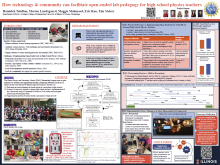Although most teachers recognize the importance of taking investigative, open-ended approaches to students’ learning experiences, implementing them in high school classes can be challenging for teachers. In this work, we analyzed data from multiple sources from a teaching Community of Practice (CoP) to investigate (a) barriers to taking an open-ended approach in teaching labs in physics classes, (b) shifts in teachers’ beliefs about taking an open-ended approach during their engagement in a physics teaching CoP in the Illinois Physics and Secondary Schools partnership program (IPaSS), and (c) a case study of one teacher whose shifts in perceptions about taking an open-ended approach in teaching labs led to her successful implementation in her class. The findings confirm the existence of well-known psychological and structural barriers that can prevent teachers from adopting investigative approaches in teaching physics labs. Moreover, we learned how the interaction of these barriers further complicates the adoption of open-ended approaches in physics classes. The study also revealed a significant gap between teachers’ current practices and their desired methods of conducting labs, particularly in terms of structured versus open-ended approaches. The case study offered deeper insights into how shifts in teaching practices occur through changes in perceptions within a supportive CoP.
Opening Pathways into Engineering Through an Illinois Physics and Secondary Schools Partnership
Download Original:
Principal Investigator:
Discipline/Topic:
Target Audience:
